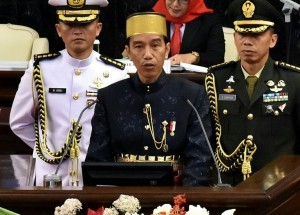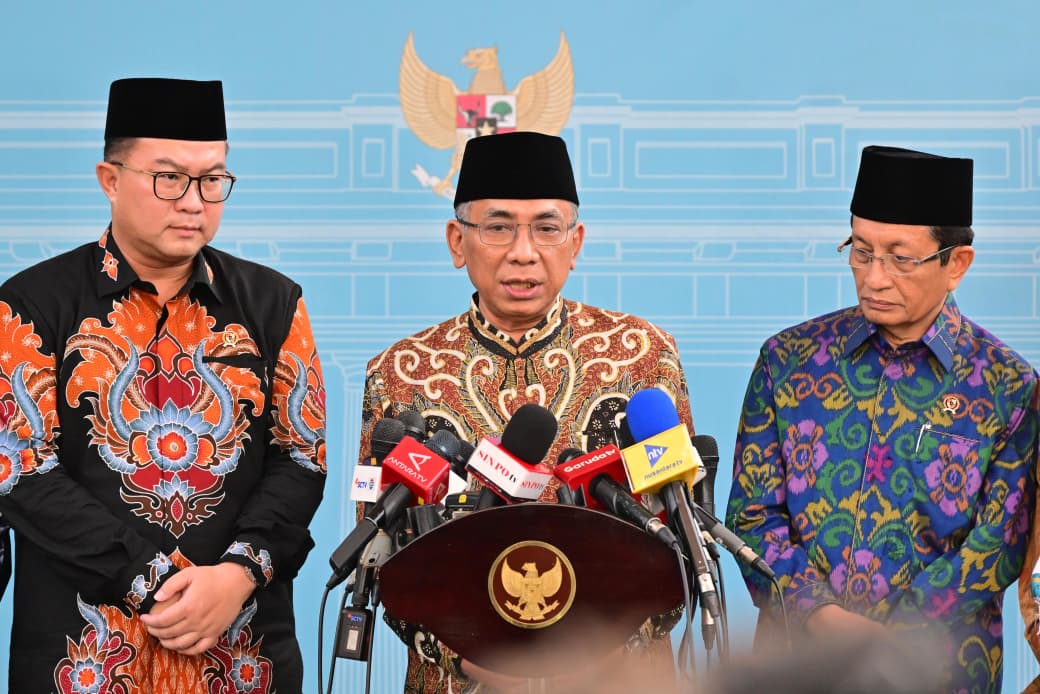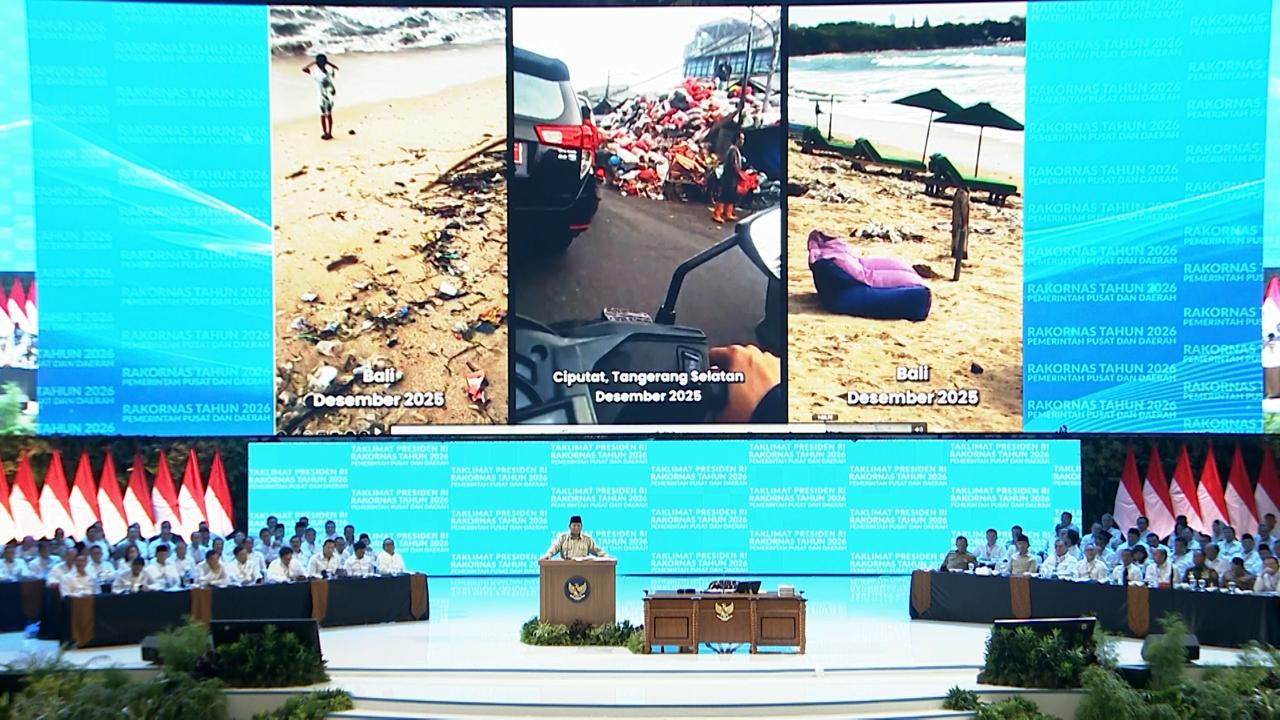No State Institution Has Absolute Power, President Jokowi Affirms

President Jokowi delivers Address of the President of the Republic of Indonesia at the Annual Session of the Peoples Consultative Assembly of the Republic of Indonesia 2017, at the Nusantara Building of the House of Representatives Jakarta on Wednesday (16/8)
President Joko Jokowi Widodo conveyed his heartfelt gratitude and appreciation to all State Institutions, for their togetherness, synergy and good mutual cooperation. The President convinced that such togetherness, synergy, cooperation will not weaken the constitutional duties and responsibilities imposed by any state institution, but instead strengthen us all in fulfiling the people’s mandate.
In the spirit of the integrity of Indonesia, the President added, state institutions can work better, should we remind each other, control each other, balance each other and complement each other.
No state institution has absolute power, more power over any other state institutions, President Jokowi said in the Address of the President of the Republic of Indonesia at the Annual Session of the Peoples Consultative Assembly of the Republic of Indonesia 2017, at the Nusantara Building of the House of Representatives Jakarta on Wednesday (16/8).
According to the President, this is the signature of our nation in running the state. This is the strength of our nation in facing every challenge. This is the distinct edge to our nation in facing the future.
President Jokowi who is accompanied by Vice President Jusuf Kalla called on people to make history as the foundation for the future. The President reminded all that a very important lesson learned from the history of our nation is that we were able to earn, we were able to achieve, we were able to proclaim independence because all children of the nation were able to unite, cooperate, and perform collective work.
We must strive to maintain, nurture, and strengthen the invaluable assets of the unity of Indonesia. And it must be our common ground to undergo and pass the tests of history, that is, to fulfil the promises of the declaration of independence. The promise of independence is to materialise an independent, united, sovereign, just and prosperous Indonesia, the President added.
I believe we will be able to accomplish this all task if we all wish to unite, eager to collaborate, and perform collective work, President Jokowi firmly said.
In the future, the President added, our nation will face tough challenges. We will explore the oceans of globalisation. We will be dealing with rapidly changing dynamics. We will be confronted with advancement of destructive technological innovation.
However, I believe, with unity, we will be able to overcome all those challenges. It is because our nation is a great nation. Our nation has proven itself to have survived the tests of time. Our nation is a nation of fighters, the President asserted.
Also on that occasion, President Jokowi said that the tasks of history for an independent, united, sovereign, just and prosperous Indonesia have been inseparable from the support and active participation of the State Institutions.
The President appreciated the performance of State Institutions in the past year. The Peoples Consultative Assembly has strived to bridge the flow of changes, thoughts, aspirations of the people and the regions, and various political ethics of nationalism based on the values of deliberation and consensus, kinship, mutual cooperation in the framework of the Unitary State of the Republic of Indonesia.
As the vanguard of ideology, the Assembly firmly safeguards Pancasila (Five Principles) as a guide of life in the society, nation, and state. Therefore, the President welcomed the Assembly’s stance to work in synergy with the Presidential Working Unit for the Fostering of the State Ideology of Pancasila which was set based on Presidential Regulation No. 54 of 2017 for the dissemination and actualisation of Pancasila values ??in the life of the nation and state.
In the meantime, the House of the Representatives also strives to carry out its internal reform to be a public representation body which is more modern and trustworthy. In performing legislative functions, the House of the Representatives, among others, has completed 14 Bills on the Priority of the 2017 National Legislation Program, some of which are directly related to the smooth support of the Governments program during 2017 such as the increase of non-oil and gas exports of high value added goods and services, the simplification of licensing and the provision of services and facilities to invest.
On the other hand, the Regional Representatives Council continues to strengthen its constitutional role, particularly in accommodating and channeling the aspirations of the people and the region. until the first semester of 2017, the Councils hard work managed to produce 10 considerations of the Bill and 5 considerations on the budget as well as 13 monitoring results over the implementation of certain laws.
Some of these considerations are sorely needed to accelerate the equitable distribution of development in the regions, such as consideration of the Bill on the Management of Border Areas and the Bill on the National Entrepreneurship and the supervision over the implementation of the Law on Villages, the President added.
President Jokowi also appreciated the appointment of the Audit Board as the external auditor for the International Atomic Energy Agency since last year for the period of 2016 2020. The nomination of the Audit Board not only gained an international acknowledgement but also raised the fame and reputation of Indonesia.
Regarding the development in legal sector, President Jokowi asserted that the Supreme Court continues to make efforts in facilitating the people to gain access to justice and public services. Thus, in the first semester of 2017, the Supreme Court has successfully implemented a number of innovations, including the Audio Text Recording System, and Electronic Individual Court Fee Calculation Mechanism in order to create an ease of court services.
Meanwhile, the Constitutional Court strives to work to affirm its role as the vanguard of the constitution. Until mid-2017, the Constitutional Court has ruled 55 cases received. Some of which were related to disputes over the results of regional elections.
This success has led the Constitutional Court to a 2017 Election Supervisory Agency Award. In carrying out its role as a guardian of the values of democracy, the Constitutional Court in 2017 has successfully maintained international community trust as the Permanent Secretariat of Association of Asian Constitutional Courts, the President praised.
President Jokowi also appreciated the efforts of the Judicial Commission in improving the accountability of judicial service in the Homeland. The Judicial Commission has resolved 8 judge advocacy cases, and monitored 89 court sessions by public report. The Judicial Commission has also facilitated the organisation of Code of Ethics and Code of Conduct Trainings for 277 judges. In safeguarding the dignity of the judiciary, the Judicial Commission has recommended the imposition of sanctions on 33 judges, ranging from mild to severe sanctions.
The President reminded all that we must not become complacent with these achievements since we still have tough challenges ahead.
We still have poverty and injustice; we are also confronted with global economic uncertainty, extremism, radicalism, and terrorist movements, the President said adding that out of all these challenges, the most crucial one that should become a common priority of all state institutions is to gain high public trust.
Public trust is the soul and energy for all state institutions in carrying out their respective duties and functions, the President added.
For that reason, President Jokowi called on all people, all state institutions to place people as the integral entity of the nation.
I encourage us all to always heed the mandate and calls of our people. I invite you all to join hands, collaborate, and perform collective work to materialise social justice for the whole people of Indonesia, the President concluded.
Also attending the Annual Session which was led by Speaker of Peoples Consultative Assembly (MPR) Zulkifli Hasan were First Lady Ibu Iriana Joko Widodo, Ibu Mufidah Jusuf Kalla, Heads, Deputy Heads, and Members of State Institutions, Working Cabinet Ministers and Heads of Non-Ministerial Government Institutions, the Third President of the Republic of Indonesia B.J. Habibie, the Fifth President of the Republic of Indonesia Megawati Soekarnoputri, former Vice President Try Sutrisno, former Vice President Boediono, Shinta Nuriyah Wahid, and Karlina Umar Wirahadikusuma.
(RMI/FID/DND/RAH/JAY/ES) (RA/LW/YM/Naster)
To see the Address of the President in English, click this link








